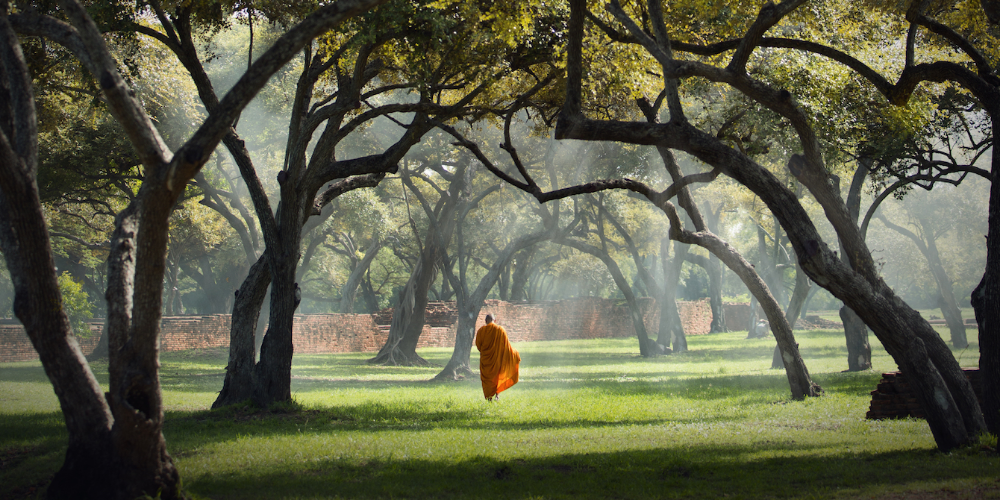The image above shows Govetts Leap Blackheath in the Blue Mountains, an area that was affected by these blazes as well. Some parts of this article direclty refer to these events. In the beginning, Mal shortly explains the four noble truths of Buddhist psychology to then expand them by creating a Buddhist framework to mitigate climate change.
A Buddhist Perspective On Climate Change
The 4 Noble Truths
The Buddha taught a way to bring an end to dukkha. Dukkha, a Pali term, is often translated as suffering but it is better to consider it as un-satisfactoriness. Dukkha can be gross such as the torments of mental imbalance and struggles with severe illness and death or it can be subtle, such as not getting what we want exactly how and when we want it.
The Buddha taught four realities, which are also called the four noble truths:
- dukkha,
- the origins of dukkha (greed, ignorance and hatred),
- freedom from dukkha and
- the path leading to freedom.
The four truths are often described in medical terms:
- disease,
- causes of disease,
- a cure is possible and
- there are treatments that lead to a cure.
The four truths are an example of the principle of dependent arising that the Buddha used to explain how things arise and also how they change and disappear. Though complex, this principle in often described simply in the suttas (the discourses of the Buddha) as follows:
“When this is, that is;
because this arises, that arises.
When this is not, that is not;
because this ceases, that ceases” (Bodhi, 2000, p. 552)
When dukkha (the 1st truth) is caused and maintained by greed, ignorance and hatred (the 2nd truth), then waking up to freedom from dukkha (the 3rd truth) is caused by living a healthy ethical lifestyle, cultivating the heart-mind with serenity and insight, and developing compassionate wisdom (the 4th truth). The fourth truth is also described as the noble eight-fold path: right view and intentions (wisdom), right speech, action and livelihood (ethics) and right effort, mindfulness and concentration (cultivation or meditation).
The term “noble” is used to denote complete psychological freedom. The framework of the four truths including the eight-fold path can also be used in a way that may not result in complete freedom but nonetheless result in a general reduction in the severity of dukkha. In this way, the path could also be called “ennobling”.
As a clinical psychologist I have used a range of empirically validated psychological approaches to help individuals reduce the dukkha of depression, anxiety and traumatic stress. In my view, the ennobling eight-fold path provides overarching guiding principles for effective psychological healing. The transformation of dukkha to freedom (from it) has been compared to a beautiful lotus growing out of the slime and sludge of compost at the bottom of a pond. This analogy gives an ironic and liberating twist to the experience of dukkha: the richer the compost, the more beautiful the lotus.
Read more: In another blog post, Mal wrote about Buddha’s awakening and how his teachings spread around the world and still help people today to find freedom from suffering.
Dukkha & Climate Change
In regard to individualised dukkha related to climate change, the eight-fold path provides a way that this particular form of dukkha can be transformed to individual freedom. In relationship to climate change at collective and global levels, the framework of the four truths could provide a way out of the problem and be described as follows:
- There is the reality of climate change and dukkha in relationship to it.
- There are human related causative factors as well as human attitudes and behaviours that make both the situation and our dukkha worse.
- It may be possible to find sustainable ecological balance and reduce the dukkha of climate change.
- There are actions we can all do that may mitigate the crisis, possibly lead to sustainable ecological balance and maintain relative psychological wellbeing.
In what follows below, I will expand on the four truths as they relate to the current climate change crisis.
You can also listen to Mal Huxter’s live-recorded talk on working with climate change with the four heart qualities. He highlights how excessive consumption and ignorance about the interconnection of things, have been instrumental in the environmental decline and climate change:
- Working On Climate Change With The Four Heart Qualities Malcolm Huxter 32:25
The First Truth: The Dukkha Of Climate Change
The extent and ferocity of the fires we are currently experiencing throughout Australia is unprecedented (September 2019-January 2020). As of the 12th of January 2020, an area of land greater than the size of Belgium has been burnt, 28 human lives lost, an estimated 1 billion native animals and thousands of livestock have been killed and over 2200 homes have been destroyed. Across the globe, California, the Amazon and parts of Europe have also experienced loss and destruction from fires. Parts of Europe are also flooding, and the sea is rising over our beautiful Pacific islands.
For many people on the east coast and other parts of Australia over the past few months, the reality of climate change has been viscerally tangible. Many of us have seen, tasted, smelt and choked on the smoke, felt oppressed by the record breaking high temperatures, been engaged in hazard reduction, or directly fought the fires. Many have experienced the red outline of the sun through the smoke haze and a surreal feeling of being in the middle of an apocalypse. For years we have been warned about the effects of climate change and now it seems this horrendous reality is here. Climate change and the threat to our existence, is possibly the greatest threat we humans, as a species, have ever needed to face.
Eco-anxiety is a term used to describe anxieties about ecological disasters, threats to our natural environment and the survival of homo sapiens, our species. Another term, solastalgia, is a neologism that refers to the mental or existential distress caused by environmental change. Solastalgia mostly relates to the climate change crisis but it can also refer to other events such as drought, volcanic eruptions and destructive mining practices such as coal seam gas extraction.
As a clinical psychologist, I have been seeing more and more individuals presenting with eco-anxiety or solastalgia. Over the last few months of our Australian crisis these presentations have multiplied. Many individuals have also presented with acute and post-traumatic stress as they have witnessed or directly experienced the trauma related to horrific bush fires. The climate change crisis is not something sometime in the future, it is happening now. The reality of the dukkha of climate change is not something happening to someone else or another population, off in distant lands, it is happening to us.
The Second Truth: Human-Related Causes And Perpetuating Factors Of Climate Change
Scientists tell us that there have been many periods of natural, non-human related climate changes over the lifetime of our planet. However, the evidence for recent increased temperatures, melting of the ice caps, rise in sea levels, pollution, extinction of species and more has been clearly linked to human activity. Putting aside the realistic demands of human overpopulation, such as the natural needs for food, water, shelter, health and mobility, it could be said that greed, ignorance and hatred have been instrumental in creating this crisis as well as making it worse.
As mentioned above, greed, ignorance and hatred are the root origins of dukkha, from a Buddhist perspective. Greed differentiates needing from wanting and involves unnecessary wanting or craving, attachment, and clinging to pleasant feelings. Hatred involves aversion, aggressive anger, rejection, fear, avoidance, struggle with, resistance to and condemnation of unpleasant feelings. Ignorance involves misapprehension, misperception, misunderstanding and simply not seeing the ways things are. According to Analayo (2019) denial of climate change is driven by greed, resignation by ignorance and anger by hatred.
It is easy to blame greedy corporations and delusional governments for the predicament we are in right now. However, we are all complicit. If one has flown in an airplane, driven a motor vehicle, travelled unnecessarily, eaten food that has been transported from afar or engaged in excessive over consumption, then we have added to the situation.
Denial
Over ten years ago the highly respected Buddhist monk Thich Nhat Hanh (2008, p.18 , in Analayo 2019, p.76) wrote:
“the situation the Earth is in today has been created by unmindful production and unmindful consumption” “the bells of mindfulness are sounding. All over the Earth we are experiencing floods, droughts and massive wildfires. Sea ice is melting in the Arctic and hurricanes and heat waves are killing thousands. The forests are fast disappearing, the deserts are growing, species are becoming extinct every day, and yet we continue to consume, ignoring the ringing of the bell [of mindfulness]”.
The wealthy often like to get wealthier and some engage in what Greta Thunberg calls “fairy tales of eternal economic growth”. When they believe the fairy tale, then it is hard to consider another reality. Most of us do not like to surrender our little pleasures. When we are challenged to restrain our habitual cravings, we resist. If we are obsessed with excessive consumption and believe we should get what we want when we want it, we will interpret information in a way that confirms our existing beliefs and ideas and ignore or argue against information that does not confirm our biases. In psychology this is called confirmation bias.
In relation to climate change, many of us cannot fathom the information. It is so challenging that we prefer not to consider it; or we think it is fake news and argue against it; or think that the scientists are over-estimating and over-reacting to the situation; or that it does not involve us or that it is so far off into the future, we need not be concerned about it. Similar to reflecting on our own inevitable mortality, many have an attitude of “not me, not now” (Analayo, 2019). In relation to climate change the above attitudes and behaviours are those of denial, which is driven primarily by greed. Ignorance also has a part to play.
Resignation
There are many simplified explanations of global warming and what each and every individual can do to mitigate it. However, many of us simply do not fully understand how this climate change crisis has developed or know how it gets worse. As a result of our not understanding or knowing, we may feel overwhelmed and helpless to make change.
Because of our ignorance we may feel that the situation has arisen from a single cause and blame something out there such as a political leader, policies or greedy fossil fuel companies. Conversely, when ignorant of the interdependence of factors related to climate change, we could overestimate our own responsibility and feel unwarranted guilt and shame. Either way, our ignorance feeds into a sense of resignation and powerlessness and we fail to act effectively.
Anger / Ill will
Eco-anxiety relates to fear while solastalgia seems more related to sadness, despair and depression. For the most part, our emotions have healthy functions. They have evolved to enable us to survive, thrive and connect. Fear and anxiety are natural and healthy responses to threat. Sadness helps us process the reality of loss, while anger can provide the energy to defend injustice or change something that is unwholesome and destructive. Our grief about the losses we are experiencing may be helping us to come to terms with this reality.
Our feelings of anxiety, grief and outrage about climate change may be motivating us to change the situation. Strong and stern action is justified and warranted when we are faced with these dire circumstances. When discerning mindfulness is absent, however, it is easy for wholesome emotions to shift to being unwholesome and destructive. When we experience strong emotions, it is like the emotion colours our lens of perception. A mind filled with anger, for example, will distort the reality of a situation to justify the anger we are feeling. Anger can hinder balanced and discerning appraisal, influence bad decisions and possibly lead to harmful actions. It is easy for us to blame others and shift responsibility for change away from ourselves. While anger may seem to give the energy to change the situation, if it is a root cause of the problem it only feeds back into the situation.
The Third Truth: The Possibility Of Sustainable Ecological Balance And Reduction Of Psychological Distress In Relationship To Climate Change
In Buddhism the terms Nibbana (Pali) or Nirvana (Sanskrit) are used in reference to the third truth. The Buddha often used analogies, similes and metaphors to describe the nature of experiences, as elaborate verbal descriptions were often inadequate. This was especially the case with Nirvana. He was reported to have said of Nirvana: “[this truth is] profound, hard to see and hard to understand, peaceful and sublime, unattainable by mere reasoning, subtle, to be experienced by the wise” (Majjhima Nikaya 26:19 in Namamoli and Bodhi, 1995, p.260). A metaphor he used for Nirvana was the extinguishing of a fire. According to one translation, the word literally means Un (nir) and binding (vana) (Thanissaro, 1993). Thus, freedom is defined not in terms of what it is but in terms of what it is not. Here, freedom means that one is unbound by patterns and tendencies that bind us to dukkha.
Most of us have not yet directly experienced Nirvana. Nonetheless, we can be motivated to practice because we have confidence and faith that freedom is possible. Trust, confidence and faith in possibilities are essential for us to arouse the energy needed to realise directly the profound inner liberation of Nirvana. In a similar way, we need confidence and a vision of possibilities to strive for achievements in the outer world.
When confronted with the plethora of information about climate change we could fall victim to unrealistic pessimism and hopelessness, lose sight of possibility, fail to act effectively and not find solutions to this complex crisis. However, if we can keep our hearts open to possibility, then it is more likely that positive change can manifest and be realised.
In regard to achieving sustainable ecological balance, we may not have yet actually experienced this possibility. Yet, if we can engage in realistic optimism, we can nourish the motivation to act effectively and practice our commitments skilfully. The eight-fold path helps to provide some guiding principles for wise climate change decisions and actions.
The Fourth Truth: The Path Of Practice
In Buddhism, behaviours and mental and emotional states are classified as wholesome, unwholesome or neutral.
Wholesome refers to those states of mind and behaviours that are helpful in leading towards the long-term welfare, wellbeing and psychological freedom of self and other. Unwholesome refers to those states of mind and behaviours that are not helpful in leading towards the long-term welfare and wellbeing of self or other and eventually increase and bind us to more dukkha. Neutral states of mind and behaviours are neither wholesome nor unwholesome.
The factors of the noble and ennobling eight-fold paths are prefixed by the term “right”, indicating that they are wholesome. It is also possible to have “wrong” view, intentions, speech, actions, livelihood, effort, mindfulness and concentration. In this context, “wrong” means that the way the factors are practiced and engaged with are unwholesome and they eventually lead to an increase of dukkha.
The factors of the eight-fold path are divided into three groups:
- wisdom,
- ethics or a non-harming lifestyle and
- cultivation or meditation.
Each group and the factors within each group influence each other in a cyclic and interdependent manner.
Wisdom
Although there is no real beginning, the right view is traditionally considered as the first factor and is at the beginning of the path. Right view is also at the conclusion of the path arriving at the insight of wisdom. Right view relates to being able to see things clearly as they are. At a noble level it is about seeing dependent arising and knowing experientially that causes have effects. This knowledge includes the understanding that actions of body, speech and mind will have consequences. Wholesome actions will generally incline away from dukkha. Unwholesome actions, on the other hand will lead to increased dukkha, either immediately or eventually.
Right view at a noble level also refers to understanding that all conditioned things are impermanent (annica-Pali), unreliable or unable to provide enduring satisfaction (dukkha) and not-self, interdependent or empty of single “thingness” (anatta-Pali). At ennobling levels, right view could refer to having clear and accurate understanding about something. This could be for example, knowing how anxiety or depression arises and how to reduce its severity.
With climate change, right view could be as simple as understanding that increased carbon dioxide and methane in our atmosphere has a greenhouse effect that leads to increased temperatures across the globe. While reducing fossil fuel emissions and forest clearing, as two examples, could counter global warming. When we have a clear (right) view of something we are in a better position to make decisions that lead to a resolution of the problem
Right intentions are the second factor on the path. When we can see with insight that greed, ignorance and hatred lead to increasing dukkha, then right intentions are those that reduce and uproot these causes of dukkha. They are the resolve, commitment or conviction to act in ways that reduce the dukkha within ourselves, others and / or the world around us. At the noble level, right intentions generally refer to intentions of letting go, harmlessness (compassion) and good will (benevolence). As far as climate change mitigation is concerned a right intention could be as simple as taking a vow to actively reduce our own carbon footprint.
Ethics
The ethical factors of the eight-fold path are those actions that are consistent with our understanding and our best intentions. Right speech, action and livelihood generally refer to non-harmful actions of body, speech and mind. Being ethical is considered as the foundation of effective meditation practice. Ethics provide the composure and mental stability conducive to the cultivation of the heart-mind, which is meditation.
Though much can be written about the ethical factors of the path, they can be summarised by considering the five Buddhist precepts, which are:
- The training to refrain from intentionally killing living beings
- The training to refrain from taking what is not freely offered
- The training to refrain from false and harmful speech
- The training to refrain from harmful sensual (usually sexual) conduct
- The training to refrain from non-prescription intoxicants (such as alcohol and substances of abuse) that cloud the mind
Thich Nhat Hanh (1993) skilfully articulates the five Buddhist precepts in ways that are more proactive as follows:
- Aware of the suffering caused by the destruction of life, I vow to cultivate compassion and learn ways to protect the lives of people, animals, plants and minerals.
- Aware of the suffering caused by exploitation, social injustice, stealing and oppression, I vow to cultivate loving-kindness and learn ways to work for the wellbeing of animals, plants and minerals. I vow to practise generosity by sharing my time, energy and material resources with those in real need.
- Aware of the suffering caused by sexual misconduct, I vow to cultivate responsibility and learn ways to protect the safety and integrity of individuals (of all ages), couples, families and society.
- Aware of the suffering caused by unmindful speech and the inability to listen to others, I vow to cultivate loving speech and deep listening in order to bring joy and happiness to others and relieve their suffering.
- Aware of the suffering caused by unmindful consumption, I vow to cultivate good health, both physical and mental, for myself, my family and my society by practising mindful eating drinking and consuming.
The precepts are not rules imposed by an external authority but are principles that are conducive to living harmoniously and compassionately with others. They are also conducive to developing the mental and emotional stability, clearness of conscience and mental/emotional fitness needed to embark on the cultivation of awareness and attention (meditation).
In regard to climate change mitigation, the ethical factors of the path could be actions consistent with commitments formulated with ennobling right intentions. Specific non-harming actions of body, speech and mind would vary from individual to individual. They could be a simple as living a simple life, reducing unnecessary energy and resource consumption and our own carbon footprint, recycling and reusing, inclining towards a more plant based diet, riding a bicycle to work rather than driving, deciding against flying overseas and choosing instead a local destination for the next holiday, writing to climate denying politicians to change policies that increase fossil fuel emissions, joining peaceful protests and acting compassionately and benevolently to those in need as well as to ourselves.
When we act in ways that are consistent with what we truly value as well as what is best for ourselves, others and climate change mitigation then we feel empowered. Acting with courage, commitment, conviction and purpose can be uplifting and freeing from the bind of dukkha. Such actions can counter the malaise of resignation, the burden and pain of ill will and anger and provide a much more sophisticated source of joy and happiness than that derived from gratifying our addiction to over consumption. Acting in meaningful ways can reduce and possibly bring an end to the dukkha of eco-anxiety and solastalgia.
Meditation
The meditation factors of the path are right effort, mindfulness and concentration.
Right effort refers to a level of energy that is balanced between laxity and over-exertion. Sometimes right effort is referred to as being courageous, because in meditation we may uncover aspects of ourselves that we would prefer to avoid. At the noble level, right effort has four aspects: the effort involved in abandoning unwholesome states and behaviours, the effort involving in keeping the unwholesome at bay, the effort to arouse the wholesome and the effort to maintain and cultivate whatever wholesome states and behaviours have already arisen.
The next factor on the path is mindfulness. Mindfulness is the English translation of the Pali word sati. Sati literally means “memory”. As a factor on the eight-fold path it generally refers to remembering to be present as opposed to the oblivion of forgetfulness. Mindfulness remembers to maintain unwavering attention and awareness of the present so that we remain in contact with current realities. Even though mindfulness is anchored in the present, it can also be directed to the past and the future. Mindfulness remembers the lessons from the past, thus helping to develop wisdom. Mindfulness also remembers our valued directions and commitments for the future, thus keeping us on a wise path for life.
The eighth factor on the path is right concentration, which is also called right samadhi. Samadhi literally means the gathering of attention and placing it in one spot. Another way of describing concentration is as the unification of attention. When we cultivate concentration it results in tranquillity, calm and serenity as well as mental luminosity, stillness, quietude and clarity. Concentration helps to focus attention so that it has the power of penetration. This power has been compared to using a telescope to look at the moon. Without a telescope the moon just looks like a white disk in the night sky. With a telescope we can observe the details of the moon’s surface with clarity. Like a telescope directed to observe our own minds, concentration gives power to investigation, which is a factor of awakening.
Mindfulness and concentration work together in mutually supportive ways to develop serenity and insight, the two aspects of Buddhist meditation. Serenity practices tend to emphasise concentration and absorption, while insight practices emphasise mindfulness, enquiry and investigation. Together, serenity and insight produce liberating wisdom and waking up to Nirvana.
As far as the reduction of dukkha in relation to climate change is concerned, mindfulness helps us be aware of what is helpful for climate change mitigation and what is unhelpful. Being aware enables us to develop, support and act in helpful ways. It also helps us restrain ourselves from acting in unhelpful ways. At an individual level, mindfulness and concentration can help us ground in the realities of the present, short circuit unhelpful worry and rumination and provide a psychological refuge. Mindfulness and concentration can also mature climate change mitigation wisdom, which helps us to think clearly and with discernment.
A Buddhist Framework For Mitigating Climate Change
The factors of the eight-fold path work together strengthening and supporting each other. They are often depicted as eight spokes on a wheel that builds momentum as it rolls towards the liberation of Nirvana. The four noble truths and the eight-fold path can provide a framework for climate change mitigation and the end of eco anxiety and solastalgia. Collectively, individual actions can make significant differences.
When as individuals we have clarity, insight, purpose and direction then collectively we can act effectively and powerfully to meet the challenge of our current climate change crisis. May we all collectively meet the challenge with compassionate wisdom, resolute commitment and effective action. May we all wake up to the liberating peace of Nirvana.







